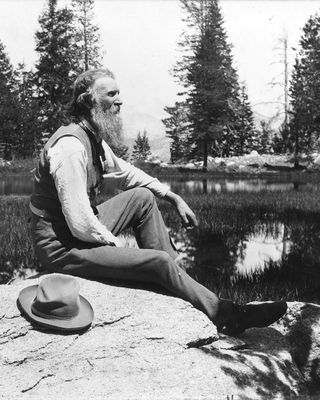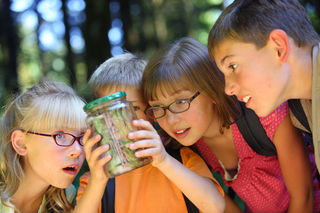5 Ways Outdoor Learning Optimizes Children's Well-Being
Educating children outside of the classroom has multiple benefits.
Source: Hurst Photo/Shutterstock
Increasingly, children around the world have fewer and fewer opportunities to play and learn outdoors. Growing evidence shows that the disconnection from nature caused by urbanization and living in a digital era (along with a host of other reasons) is causing the minds and bodies of 21st century children to short-circuit on many levels.
According to a team of international experts, the lack of time spent out-of-doors is triggering a swath of unexpected negative consequences for younger generations. A new study, published today, makes a strong case for policymakers to consider the benefits of implementing outdoor learning as a cost-effective way to improve children's well-being and quality of life.
"Nature's Peace Will Flow Into You...While Cares Drop Off Like Autumn Leaves"
Over a hundred years ago, in response to industrialization and mass migration towards city life, there was a 20th century push by people such as President Theodore Roosevelt and Sierra Club founder, John Muir, to encourage Americans to reconnect with Nature. In his 1901 book, On National Parks, Muir wrote,
"Climb the mountains and get their good tidings, Nature's peace will flow into you as sunshine flows into trees. The winds will blow their own freshness into you and the storms their energy, while cares will drop off like autumn leaves. As age comes on, one source of enjoyment after another is closed, but nature's sources never fail."

John Muir circa 1902.
Source: Library of Congress/Public Domain
We all know that our daily lives in the 21st century are dominated by portable digital devices and smartphones that have the power to sever our ties with the naturalenvironment—in ways that John Muir could have never imagined. The latest global research shows that in nations around the world, children are losing their freedom to play, explore, and be physically active in their outside environments for a wide range of complex reasons. Being denied the opportunity to explore the outdoors can have detrimental impacts on a child’s physical and psychological development. What can we do to fortify stronger connections with Nature?
In recent years, I’ve written a number of Psychology Today blog posts about the importance of the environment on a child’seducation. Over the past 10 years, there've been five significant international reviews focused on the childhood benefits of formal and informal learning in natural environments.
As the parent of an 8-year-old, I have a vested interest in keeping my finger on the pulse of the latest empirical findings on various ways to optimize a child's well-being. My hope in writing about these topics in a public forum is to be a small catalyst for creating a groundswell that motivates policymakers to think outside the box when it comes to keeping our children healthy, happy, and resilient in a topsy-turvy and rapidly changing world.
In my opinion, the most poignant research on the benefits of spending time outdoors are reports that being immersed in nature increases loving-kindness and theory of mind. For people of all ages, the sense of wonder and awe that is inspired by nature creates a belief that there is something out there ‘bigger’ and more important than you in the universe. This tends to nurture the tendency to think globally and with less navel-gazing. Researchers have also found that kids who spend more time outdoors tend to have a stronger sense of self-fulfillment and spirituality than those who spend most of their time inside.
5 Ways Outdoor Learning Optimizes Children's Overall Well-Being
Learning that takes place in green spaces—such as parks, gardens, wildlife areas and woodland, as well as on outdoor field trips has been found to increase children's engagement and enriched the learning experience in many ways. Researchers have found using local green spaces can give children time valuable time outdoors at little or no increase to school budgets.
The latest research identifies multiple ways that outdoor learning can have a significant and positive impact on children's well-being. In a new report, researchers present a framework which lays out how government policymakers could introduce outdoor learning as an integral element of national education policies.
The July 2016 report, "Student Outcomes and Natural Outcomes: Pathways From Evidence to Impact 2016," was produced by Plymouth University in the UK and Western Sydney University in Australia.
The new report highlights the wide range of benefits to children of learning in the natural environment. The benefits of outdoor learning go beyond improving academic prowess. Outdoor learning also improves social skills, behavior, physical and psychological health, boosts resilience, confidence, and a sense of place.
Outdoor Learning Improves Well-Being by Creating 5 Outcomes:
- Healthy and Happy Body and Mind
- Sociable Confident Person
- Self-Directed Creative Learner
- Effective Contributor
- Active Global Citizen
In a statement, Sue Waite, Reader in Outdoor Learning at Plymouth University and one of the authors of the new report, said:
"At the moment, if outdoor learning is part of a school's curriculum in England, it is largely because the teachers recognize the values of it. With so much focus on academic attainment, there can be pressure on teachers to stay in the classroom which means children are missing out on so many experiences that will benefit them throughout their lives.This report shows that although there is significant research which supports outdoor learning for academic as well as social and personal outcomes, it is only by having that recognised by policy makers that we are likely to achieve universal positive cultural change."
Conclusion: Access to Nature Improves Well-Being Throughout Your Lifespan
The new report was produced following the Lessons from Near and Far conference led by Plymouth University in July 2015, which featured 21 international presentations intended to encourage researchers, practitioners, and policymakers to share ideas of best practice which could potentially be embedded into national outdoor learning policies. Although this research took place overseas, the findings are applicable in the United States.
I can attest to the awe-inspiring and transformative power of outdoor learning. In the 1970s, when New York City was going bankrupt, my parents decided to leave the crumbling chaos of Manhattan in pursuit of a bucolic life in rural Pennsylvania. They bought an old limestone farmhouse in Mennonite country surrounded by endless fields and green pastures close to Hershey, where they make the chocolate bars.
We left town in our wood-paneled Chevy station wagon with John Denver songs playing on the radio around 1974... I joined 4-H and got a horse named Commander. Once in Pennsylvania, my parents let me run wild. I was free to explore the never-ending wilderness on horseback to my heart's content. I got lost sometimes, but always found my way home before sundown. It was an idyllic childhood existence.
As I was growing up, my mom always had singer-songwriters—such as John Denver, Cat Stevens, Van Morrison, Joni Mitchell, James Taylor... who seemed to deeply value a connection with nature—in heavy rotation on the 8-Track player in the car and the turntable at home. These songs became the perfect soundtrack to have the conversion experience of an urbanite—who saw the world as a concrete jungle in black and white with lots of shades of gray—to experiencing a type of rebirth in which everything in the world suddenly sprung to life in vivid technicolor after tapping into the power of nature.
My mother and father were laid back to the point of being the antithesis of today's typical "helicopter parents." I like to think that their hands-off approach was based on a conscious decision that they wanted the experiences I had living in the country to feel autonomous and boundary-less. That said, a laid back approach to parenting was also part of the American zeitgeist of the '70s. Whatever my parents' motivation for letting go of the reins and allowing me and Commander to run free through the corn fields, it was the best education I could have gotten at the time.
To this day, whenever I hear the song "Morning Has Broken," it takes me right back to the first time I felt every cell in my body connect with the power of nature on a visceral level when I was 9 years old. It was a conversion experience that makes me crave living close and connected to nature as an adult. In closing, below is a 1971 live version of the song, which holds timeless wisdom and captures an innocence that seems to be lost these days. I'm optimistic that we can renew some of our lost innocence by fostering outdoor learning from a young age in every nation.
To read more on this topic, check out my Psychology Today blog posts,
- "Kids and Classrooms: Why Environment Matters"
- "The Power of Awe: A Sense of Wonder Promotes Loving-Kindness"
- "One More Reason to Unplug Your Television"
- "Want to Improve Your Cognitive Abilities? Go Climb a Tree!"
- "Is Excessive Screen Time Slowly Undermining Our Resilience?"
- “Large City Parks and Green Spaces Promote Well-Being"
- "Where Do the Children Play in 2014?"
- "Everyday Access to Nature Promotes Well-Being As We Age"
- "'Peripatetic Meetings' Promote Health and Creative Thinking"
- "Want to Reduce Your Risk of Depression Naturally? Try This."
© 2016 Christopher Bergland. All rights reserved.
Follow me on Twitter @ckbergland for updates on The Athlete’s Way blog posts.
The Athlete's Way ® is a registered trademark of Christopher Bergland.



No comments:
Post a Comment